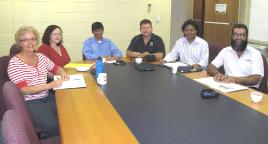Uni keen to see if micro-credit of value for Indigenous communities
Published on 08 November, 2010
CQUniversity researchers Dr Rakesh Gupta and Kylie Radel are evaluating whether a 'micro-credit' funding system could help Indigenous communities develop self-sustaining small businesses.
The 'micro-credit' system has been rolled out worldwide by Grameen Bank. Grameen Bank provides credit to the poorest of the poor to combat the vicious cycle of poverty which afflicts half the world's population.
Dr Gupta, a Senior Lecturer with the School of Commerce and Law, says there is also a significant poverty problem in Australia, especially in rural and remote Indigenous communities.
"When measured by mainstream society indicators, Indigenous Australians' average gross household income was $460 per week. This is compared with the average household income for non-Indigenous people at $740 per week - nearly double," Dr Gupta said.
"One potential avenue for breaking the poverty cycle may be the development and implementation of a form of personal loan known as micro-credit.
"The purpose of micro-credit is to provide ‘small' loans to enable people to purchase raw materials, tools or other items to enable them to access jobs or even to develop their own small business.
"For example, an apprentice electrician will need appropriate clothing and tools to be able to work, which may be covered through a micro-credit loan.
"However, the current models of micro-credit have been developed and used in countries such as Bangladesh, Peru, Costa Rica and some African nations which have very different cultural and social environments to Australia and Australian Indigenous communities."
Dr Gupta said the CQUniversity team has set up a reference group of Indigenous community members who will advise on the issues and needs of the communities, cultural fit for the model and other issues that may assist with the success of the model. This will provide the research with strong social and cultural grounding.
He welcomed feedback from anyone with suggestions for the reference group.


